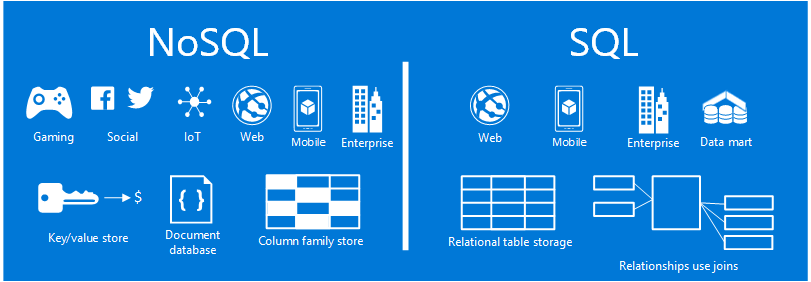A Comparison of SQL and NoSQL to Simplify Your Database Decision
When you implement ETL processes, you must decide how to structure your data and what technologies to use. To make an informed decision, let’s start from the basics.
Join the DZone community and get the full member experience.
Join For FreeHave you been investing your time, effort, and resources in building ETL procedures that keep migrating data from one database to another? Is your RDBMS fully equipped to deal with unstructured and non-traditional data? With Big Data becoming the hottest segment of database technology, what’s your game plan to stay on top of the ever-evolving technologies?

However you implement ETL processes, you must decide how to structure your data and what technologies to use. To help you make an informed decision that is right for you, let’s start from the basics.
What Is SQL?
SQL is a language that facilitates communication with relational database management systems, most of which have their exclusive proprietary extensions. SQL can do everything from accessing and manipulating databases to inserting records and creating views.
What Is NoSQL?
NoSQL encompasses a wide range of database technologies that are designed to cater to the demands of modern apps. NoSQL systems make it easy to deploy and store a wide range of data types, and they excel in performance — until you need data consistency and start applying techniques found in DBMSs that slow performance.
The Key Differences Between NoSQL and SQL
| NoSQL | SQL | |
| Storage | NoSQL encompasses a host of database types ranging from graph and key-value to document and columnar, and each has a different data storage mechanism. | Data is typically stored in a relational model where columns contain data points and rows comprise of all the information concerning a single entity. |
| Flexibility | Since schemas are dynamic in nature, information can be updated on the fly. | In SQL, every record conforms to a predefined schema where the columns must be determined and locked before the data can be entered and it cannot be amended later without going offline and modifying the entire database. |
| ACID Compliance | NoSQL emphasizes performance over data integrity and most NoSQL systems compromise on ACID compliance for performance, so organizations use NoSQL for data types not impacted by consistency. | SQL databases default to enabling ACID compliance though most offer options to favor performance over data integrity for some operations (e.g., asynchronous replication between sites can risk data loss during failure). |
| Access | Access is allowed in well-defined and narrow patterns which make performance and scalability dependable and expected. | Not known beforehand and hence requires assumptions that are then translated into index definitions. |
Addressing the Big Question: To SQL or NoSQL?
Your decision should be based on your immediate and long-term business requirements in terms of data needs, performance, and data types because there is no one-size-fits-all solution when it comes to database technology. While NoSQL comes with the advantages of speed and scalability, SQL remains the only choice for applications that require ACID compliance. If your business is not going to experience significant growth in the near future and your data is structured, SQL is the right choice for your business. But if you desire rapid processing of real-time data and you don’t have transactional data to protect, NoSQL is your go-to solution.
Most organizations will need a combination of both – both have their use cases in today’s digital business demands. Enterprises that use both concurrently are sure to deliver better business outcomes and maximize their ROI but they must apply them appropriately and they must deliver 100% uptime despite sudden traffic spikes. These situations show the value of database load balancing software that lets you handle high loads at peak performance levels without needing any modifications at the app level.
Database load balancing is valuable for addressing some of the scaling and performance challenges that can come with SQL databases. The software’s capabilities include:
- Response time-based routing to ensure peak performance at all times.
- Surge queue feature to avoid overloading of the database server.
- Query routing to prevent unexpected outages.
- Connection pooling and multiplexing to facilitate fast and easy access, year round.
- Read/write split support to facilitate optimum utilization of available servers.
- App-transparent failover to improve application availability during database failures.
With database load balancing software, enterprises get the best advantages of SQL and NoSQL databases, so they never have to rethink their database decision.
Published at DZone with permission of Laura Czajkowski, DZone MVB. See the original article here.
Opinions expressed by DZone contributors are their own.

Comments